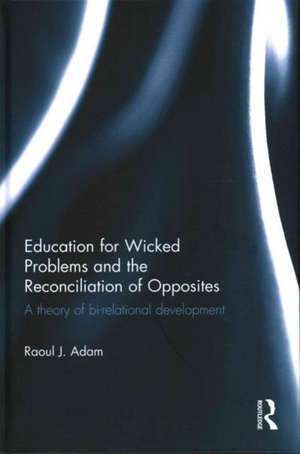Education for Wicked Problems and the Reconciliation of Opposites: A theory of bi-relational development
Autor Raoul J. Adamen Limba Engleză Hardback – 3 mar 2016
Applying an original theory of bi-relational development to wicked problems, Adam proposes that our everyday ways of knowing and being can be powerfully located and understood in terms of the creation, emergence, opposition, convergence, collapse and trans-position of dyadic constituents such as nature/culture, conservative/liberal and spirit/matter. He uses this approach to frame key debates in and across domains of knowledge and to offer new perspectives on three of the most profound and related problems of the twenty-first century: globalisation, sustainability and secularisation.
This book is a comprehensive study of dyads and dyadic relationships and provides a multidisciplinary and original approach to human development in the face of wicked problems. It will be of great interest to students and academics in education and psychosocial development as well as professionals across a range of fields looking for new ways to recognise and (re)solve the wicked problems that characterise their professions.
Preț: 849.37 lei
Preț vechi: 1141.42 lei
-26% Nou
Puncte Express: 1274
Preț estimativ în valută:
162.55€ • 169.08$ • 134.19£
162.55€ • 169.08$ • 134.19£
Carte tipărită la comandă
Livrare economică 15-29 aprilie
Preluare comenzi: 021 569.72.76
Specificații
ISBN-13: 9781138962859
ISBN-10: 1138962856
Pagini: 296
Ilustrații: 10
Dimensiuni: 156 x 234 x 20 mm
Greutate: 0.54 kg
Ediția:1
Editura: Taylor & Francis
Colecția Routledge
Locul publicării:Oxford, United Kingdom
ISBN-10: 1138962856
Pagini: 296
Ilustrații: 10
Dimensiuni: 156 x 234 x 20 mm
Greutate: 0.54 kg
Ediția:1
Editura: Taylor & Francis
Colecția Routledge
Locul publicării:Oxford, United Kingdom
Public țintă
Postgraduate and ProfessionalCuprins
Part 1. Theory. 1. Wicked Problems and the Reconciliation of Opposites. 2. Wicked Problems and the Recognition of Opposites. 3. The Origins and Classification of Dyads. 4. A Theoretical Background to Bi-relational Development. 5. A Theory of Bi-relational Development (BirD). Part II. Illustrations. 6. Illustrations of Bi-relational Development in Life Narratives. 7. Bi-relational Development and Wicked Socio-Cultural Problems. 8. Bi-relational Development and Wicked Socio-Ecological Problems. 9. Bi-relational Development and Wicked Socio-Religious Problems. Part III. Applications. 10. General Applications of Bi-relational Development in Education. 11. Narrative Explorations of Bi-relational Development in Education. 12. Conclusion and Final Reflections on Bi-relational Development.
.
.
Notă biografică
Raoul J. Adam is an Adjunct Senior Lecturer in the College of Arts, Society and Education at James Cook University, Australia. He gained a PhD in Cultural-Cognitive Development from the University of Queensland in 2008 and has since lectured and researched on the cognitive-epistemic dimension of complex social problems. His lecturing was recognised by a National Citation for Teaching and Learning in 2010 and his research was supported by a fellowship with The Cairns Institute in 2014. Education for Wicked Problems & the Reconciliation of Opposites is his first book.
Descriere
This book explores the relationship between the human tendency to bifurcate the world, and the creation and resolution of our most wicked social problems. Using an original theory of bi-relational development, it proposes that our everyday ways of knowing and being can be powerfully located and understood in terms of the creation, emergence, opposition, convergence, collapse and trans-positioning of dyadic constituents.











